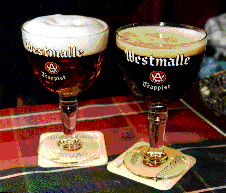 |
Brewtopia Events  |
 |
Brewtopia Events  |
Owen Ogletree and Paul Eckloff have visited all five of the remaining Belgian Trappist monasteries that still brew their own ales. This is our story of one of them.
|
Brewtopia Events
Brewtopia Events Beer Travel Pages...
|
All of Belgium's Trappist monasteries that produce beer are cloistered and usually closed to the general public. Westmalle is no exception. The brewhouse dates from the 1930's and was producing a beautiful aroma of boiling wort on the day we visited. There is also a dairy on the abbey grounds with quite a large population of cows. The abbey, brewery, and dairy buildings all blend together into an admirable, cohesive structure. While the exteriors of the Trappist breweries of southern Belgium seem to be earthy, wooden, and irregular, Westmalle seems cleaner with architecture built along more sharp, sterile, geometric lines. After admiring the exterior of the abbey and hearing the bells of the tower, we proceeded back across the street to sample Westmalle's beers at the beautiful Cafe Trappisten. The Cafe Trappisten has a huge outdoor patio that was closed for the winter as well as a clean, sharply decorated, cavernous interior. The beer menu included many Dutch and Belgian pilsner type beers, but the stars of the cafe are definitely the two Westmalle products. Westmalle Dubbel registers at 5.5 percent alcohol by weight and around 7 by volume. The Dubbel is not as rich and full-bodied as one might assume from the color and aroma. It has a brown color from dark malts and dark candy sugar as well as a dry finish. One waiter at the cafe told us that the dubbel is a favorite with the locals because it has a soft flavor and "does not go right to one's head." The beer also has hints of fruit and chocolate. The Tripel is often available at the cafe on draft. Westmalle Tripel is a beautiful beer made with pale candy sugar. It has an alcohol content of 7 percent by weight and 9 by volume according to a bartender. The Tripel definitely produces a warming of the stomach and a glow to the head. It has a very pale color produced from a mash of light pilsener malts. Styrian Goldings hops are used along with some German varieties and the classic Saaz pilsener hop. After a long secondary fermentation, the Tripel is bottled with a dose of sugar and yeast. It is a memorable drink with hints of fruit and pepper. This beer holds up well in the bottle over time and seems to soften with age. Trappist ales have a large appeal for many people because they make such a pleasant accompaniment to certain foods. The Dubbel and Tripel of Westmalle are wonderful examples. The Dubbel goes very well with a dinner of beef or lamb while the Tripel brings out the flavor of seafood and certain vegetables. In terms of interesting bars and breweries, rural areas of northern Belgium can often prove to be unremarkable to visitors. The abbey at Westmalle and the Cafe Trappisten more than make up for this and are certainly worth the drive from any point in Belgium. ______________________ Owen Ogletree is an award-winning homebrewer, certified beer judge, and Director of Athens' (Ga.) Classic City Brew-Fest held each spring.
|
Main Title Page | Classic City Brew-Fest | Cool Beer Links
E-mail us with your questions or comments
E-mail us to subscribe to our Electronic Brewsletter